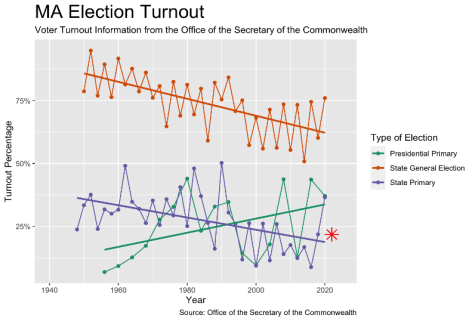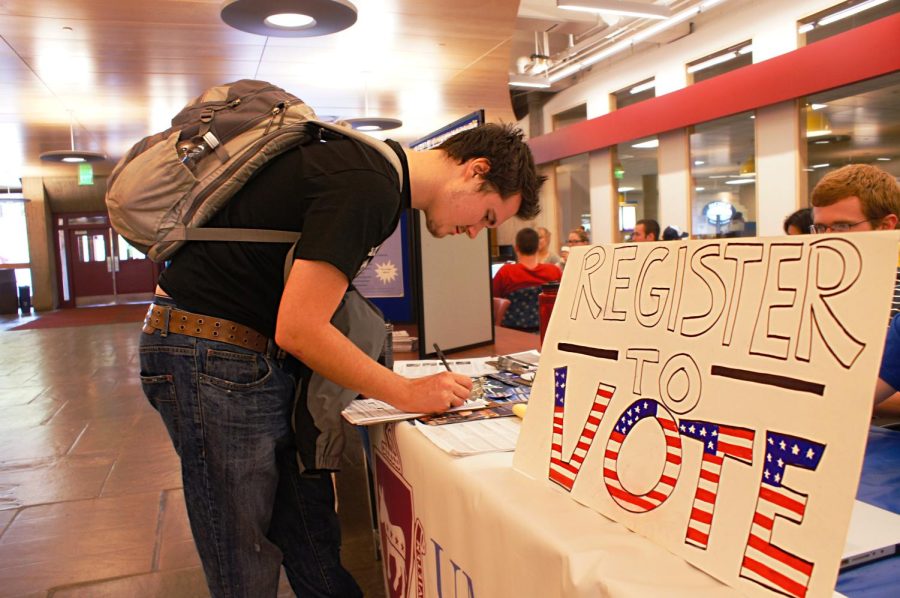Massachusetts voters will return to the polls on Nov. 8 to elect numerous statewide officials, including representatives in congress, governor, lieutenant governor and attorney general, among others. The governor and lieutenant governor elections are significant as Charlie Baker and Karyn Polito, the current governor and lieutenant governor respectively, announced last December that they would not be seeking re-election. The announcement was despite recent surveys rating Baker the most popular governor in the U.S. with a 74 percent approval rating in April 2022.
The University of Massachusetts has partnered with the Town of Amherst to provide students with the opportunity to vote. Amherst Town Clerk Susan Audette explained that any student who lives on campus is allowed to register to vote in the Town of Amherst. Students can register online, in person or by mail. She did note, however, that if you are an out-of-state student, you must use a mail-in registration. Students will have the opportunity to vote by mail, early or on election day as long as their voter registration is in Amherst.
“We want to make sure that students know that we have renamed our precincts and their previous poll locations have changed with accordance to the 2020 census,” Audette said.
Audette noted that they have seen low turnout from students in the past, outside of the presidential elections. She has been encouraged, however, by the number of students voting by mail recently.
“We want to make sure students’ voices are heard,” Tony Maroulis, UMass Executive Director of Community and Strategic Initiatives, explained. The University will be launching a website, www.umass.edu/studentlife/umassvotes, that will assist students in registering to vote, direct students to where they can vote and answer other questions related to the upcoming election.
The website is in partnership with an initiative by the Office of the President of the University of Massachusetts system, called #UMassVotes, which seeks to encourage students to engage with “critical issues that affect the Commonwealth,” according to Maroulis.
Maroulis explained that in previous elections, the University has partnered with the Town of Amherst to establish an early voting space at UMass for students to vote. However, due to a lack of significant student participation, students will have to vote at Amherst Town Hall if they choose to vote early.
“We really want to see our students participate in their local community that they’re living in for the next four or more years,” Maroulis said.
When asked why students should vote in non-presidential elections, Hunter Cohen, a senior studying history, explained that those running in these elections are the ones who are making the decisions that directly affect students. “State representatives and state senators, the people we elect on non-presidential election years, are the ones making decisions about funding for the UMass system,” he said.
“Voting is extremely important, and high turnout in competitive elections helps cultivate representatives and officials elected by a representative majority of their constituencies. It also tells them that if they do a bad job in office, there’s an engaged and active electorate ready to hold them accountable,” Cohen continued.
The 2022 Massachusetts Primary Election Results
The 2022 midterm primaries brought many candidates from both sides of the aisle vying for their respective party’s nomination.
According to the Office of the Secretary of the Commonwealth, which oversees all elections in Massachusetts, the 2022 primary saw only 21.8 percent of registered voters cast their ballot.

Additionally, in Springfield, the closest major city to the UMass, the turnout was just 10.4 percent, compared to 16.6 percent in Worcester and 19.2 percent in Boston.
Cohen believes that UMass does not do enough to encourage students to vote.
“I think if the University gave students off from class to vote, worked in closer cooperation with the Town of Amherst to register students to vote in town and set up more and better-advertised polling precincts near/in the University, it would go a long way to encourage UMass-ers to vote.”
In the race for governor, Maura Healey won the Democratic primary, fending off Sonia Chang-Diaz, a state senator, with 85 percent of the vote. Healey, the current state attorney general, had been seen as the immediate frontrunner in the race when she had launched her campaign in January, following Baker’s announcement. Chang-Diaz ended her bid for governor in June but remained on the ballot.
Geoff Diehl, a former state representative, defeated Wrentham business owner Chris Doughty with 55 percent of the vote.
The primary race for lieutenant governor brought new and seemingly unknown faces to Democratic voters.
According to a poll done by MassInc Polling Group in August, 55 percent of likely Democratic primary voters had never heard of Salem Mayor Kim Driscoll, the favorite to win the nomination at the time. Similarly, her opponents, state Sen. Eric Lesser and state Rep. Tami Gouveia, had limited name recognition with likely Democratic primary voters. The poll found that 65 percent of voters had never heard of Lesser and 80 percent had never heard of Gouveia.
Driscoll secured the nomination with 47 percent of the vote. She will go on to face Leah Allen, a former state representative, in November. Allen defeated Kate Campanale, another former state representative, with 52 percent of the vote.
The Democratic primary for attorney general saw former Boston City Councilor Andrea Campbell defeat Shannon Liss-Riordan, a “nationally-recognized” labor attorney with 50 percent of the vote. She will face the Republican candidate, James McMahon III, who ran unopposed. McMahon is currently an attorney in Bourne and was the 2018 Republican nominee for attorney general.
The 2022 Massachusetts General Election
While most will be looking at the governor, lieutenant governor and attorney general elections, other significant positions will be up for election in November. These include the Secretary of the Commonwealth, Treasurer, Auditor, the nine Massachusetts congressional seats in the U.S. House of Representatives and the Governor’s Council. Other local elections in the state include state representatives, some state senators and other municipal positions and ballot questions.
There will be four state-wide ballot questions for voters in November. The Commonwealth provides voters with a collection of arguments for both sides of each question and more details about each question.
Question 1 seeks to amend the state constitution to “establish an additional 4 percent state income tax on that portion of annual taxable income in excess of $1 million.” A “yes” vote would amend the state constitution to “impose an additional 4 percent tax on that portion of incomes over one million dollars to be used, subject to appropriation by the state Legislature, on education and transportation.” A “no” vote would make no change to the current constitution.
Question 2 asks voters about the regulation of dental insurance in the state. A “yes” vote would regulate dental insurance rates, “requiring companies to spend at least 83 percent of premiums on member dental expenses and quality improvements instead of administrative expenses, and by making other changes to dental insurance regulations.” A “no” vote would make no change to the current law.
Question 3 would increase the number of licenses a retailer can have for the sale of alcoholic beverages for off-premises consumption. A “yes” vote would “increase the number of licenses a retailer could have for the sale of alcoholic beverages to be consumed off premises, limit the number of “all-alcoholic beverages” licenses that a retailer could acquire, restrict use of self-checkout, and require retailers to accept customers’ out-of-state identification.” A “no” vote would make no change to current laws.
Question 4 asks voters to keep in place a law that would “allow Massachusetts residents who cannot provide proof of lawful presence in the U.S. to obtain a driver’s license or permit if they meet the other requirements for doing so.” A “yes” vote would keep the current law in place; a “no” vote would repeal the law.
“Don’t make [voting] the extent of your political involvement,” Cohen said. “On top of voting, join advocacy groups, engage in political actions like sit-ins and peaceful civil disobedience, and join a union or organize your workplace.”
“Only by doing all these things can we win a more just and compassionate society.”
The 2022 general election will take place on Nov. 8. The voter registration deadline is Oct. 29. The deadline for a vote-by-mail application is Nov. 1. Early voting will take place from Oct. 22 through Nov. 4. Election Day polling hours will be from 7:00 a.m. to 8:00 p.m.
For more information about your voting district or how to register to vote, visit https://www.sec.state.ma.us/ele/elevoterresources.htm.
Alex Genovese can be reached at [email protected] and followed on Twitter @alex_genovese1.



















